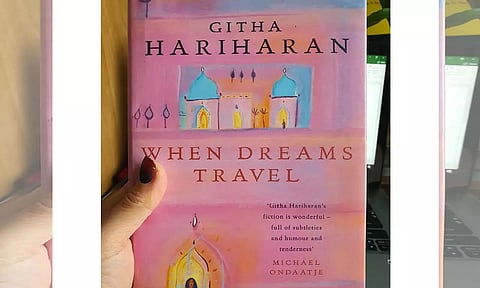
- Home
- Live Blog
- Breaking News
- Top Headlines
- Cities
- NE News
- Sentinel Media
- Sports
- Education
- Jobs

"When Dreams Travel" is an innovatively-thought through novel by Githa Hariharan, which takes up the story from the point where "The Arabian Nights" left off. And, from there the author suggests what could have possibly happened to the lead characters: Shahryar (the sultan), Shahrzad (the bride), and Dunyazad (sister, also called Dunyazade or Dinazade). Trust us; you won't get an idea as to what is inside the book, just by seeing the cover. The story is a blend of many elements: of hopes; of despair; of remembrances; of identity search and identity crisis; of freedom; of life and death and more.
The novel flows smoothly and tosses between the "dreams" with a narrative, and recalling memories. The novel includes the theme of desires, death, and other negativities. But the author has woven the story quite well, so much so that the readers can easily grasp and understand the plot. Poetry and magic play too integral roles in the entire story. The story of "When Dreams Travel" focuses on typical desires, and death.
As the three women, Shahrzad, who is the storyteller too; Dunyazad and Dilshad wait on Sultan Shahryar's endless obsessions for numerous things like sex, stories, power, love, death and memory, the author lets herself indulge in a free fall of the narrative, which is rich and of multiple colours. Their (women characters) stories are simple and similar to those women's stories, whom we meet in our day-to-day life. Yes, the pre-existing sharp-edged patriarchal power will also be felt while reading the story. Dunyazad is a middle-aged woman, who is wedded to Sultan Shahryar's brother, Shahzaman. She has lived with him in Samarkand for many years, but now she is a widow. To find out the real story and the reasons behind Shahrzad's death, which was unexpected and sudden, she reaches the palace of Shahryar. And, Shahryar had recently become a widower then. The story is set in the fictional city of Shahabad, where Dunyazad assists Prince Umar (Sultan's son) in taking over the throne- mentioned as "a new order of things."
The reader will find a sense of constant search of hope in many instances as rendered by the author (Githa Hariharan), and here is one when Dilshad, one of the characters exclaim during a narrative situation, "Is there no way out of this old story?" Dilshad is a slave girl, who is lost. Her story goes into the forest and a fairy-tale scenario. And, as soon as she says these words, she sees a way out of the forest. She is in the search for adventure, and desires for an "unmapped territory", which lands her there. She puts forth this question as she realizes that she is living a script.
While in the forest, she meets two men, one after the other: the first man deceives her into marrying him with a promise that he will help her find her way; and the second man, who was a strange yet graceful deer-man, was seduced by her. In her words, it was like "the king seizes a virgin girl; the courtesan seduces a virgin boy." It is this importunate firmness of pre-existing stories - of magical fairy tales; of myths and fictions; fictions about women and their lives that are well-explored by the author in the retelling of The Arabian Nights through this story.
Githa Hariharan is an Indian author and editor based in New Delhi, who is known for her first novel, "The Thousand Faces of Night." She has won the Commonwealth Writers' Prize in 1993. Born in Coimbatore, and brought up in Mumbai and Manila, Githa pursued a BA (in English) from University of Mumbai and a MA (in Communications) from the Fairfield University. She first worked in the Public Broadcasting System in New York. Then, she worked with a publishing firm as an editor in India. Currently, she works as a freelance editor.
Publisher: Penguin India
Available on: Amazon India Price: INR 350